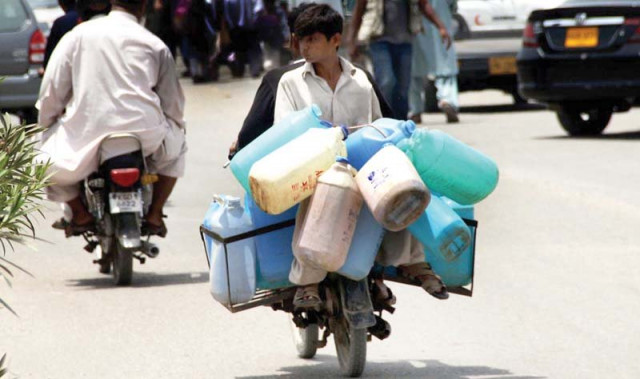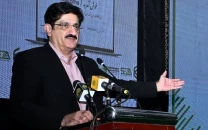KWSB to submit report on efficiency of K-IV plant
The apex court bench, headed by Justice Anwar Zaheer Jamali, was hearing the case at the SC Karachi Registry

Citizens travel with water cans in search of water as the shortage in the city worsens each passing day. PHOTO: ONLINE
The Supreme Court (SC) asked the Karachi Water and Sewerage Board (KWSB) on Thursday to submit a report on the feasibility of the recently-launched potable water project, K-IV, as it heard the illegal hydrants case.
The apex court bench, headed by Justice Anwar Zaheer Jamali, was hearing the case at the SC Karachi Registry. The judges asked the KWSB chief, Hashim Raza Zaidi, what action has been taken against the goons who stole and then sold people the water they were ought to get for free.
Zaidi replied that at least 200 illegal hydrants have been demolished since he assumed the office. The judges asked him if he had taken any action against corrupt officials within his office as such theft was not possible without their collusion, Zaidi replied in the affirmative.
Mentioning the case of DHA, Justice Sarmad Jalal Osmany asked Zaidi why no water connection was given to the neighbourhood, leaving its dwellers at the mercy of the water tanker mafia. "Today, we provided some 6.5 million gallons of water to DHA against the demand of 8MGD," Zaidi pointed out, adding that a legal hydrant in Chakra Goth was shut down just to cater to the need of DHA.
Use of hydrants
Justice Maqbool Baqar wanted to know the concept behind legal hydrants, when their use is limited to fire extinguishing and other mishaps. Zaidi said these hydrants were useful as the water utility cannot transport water to each and every corner of the city.
Pakistan Tehreek-e-Insaf lawmaker Hafeezuddin, who has been pursuing this case for a long time, intervened and argued that this was merely a tactic to make money. "In recent days, the Sindh government has issued Rs150 million to the KWSB to provide water through tankers to the most-affected localities," he said. "Nobody knows where the money went."
Zaidi brought up the K-IV project and assured that it will reduce the water problem in the city. Before adjourning the hearing, the judges asked him to submit a report on K-IV at the next hearing.
Sewage treatment
The same bench also heard on Thursday the long-running case on environment pollution. It was told that the KWSB needs at least Rs8 billion to complete its sewerage treatment plant but the federal government has yet to pay its share. The bench issued notices to the federal finance and planning secretaries to file their comments.
Zaidi said the Greater Karachi Sewerage Development Program, S-III, will treat tons of effluents emitting out of the city every day. The SC bench asked Zaidi what existing measures are there to treat toxic waters but Zaidi responded all three treatment plants in the city were not functioning and waste was going directly into the sea. "The plants are currently under maintenance and are being rehabilitated as part of the S-III project," he said.
Looking at the project map on a projector screen, the bench asked Zaidi if the resources were enough to manage toxic waste the city produced every day. Karachi produces around 500 million gallons of waste in raw form and, if the treatment plants started working, they will be capable of handling it, Zaidi assured.
When the plants were functional, the water board earned Rs9 million every year by selling its by-product, treated waste. "The completion of the project will take around four years given the funds' continued availability."
Nehr-e-Khayyam
A DHA official told the bench that they had nothing to do with the encroachments on Nehr-e-Khayyam, dumping of effluents into the sea through Boat Basin nor was it responsible for the pollution. "It was the responsibility of Cantonment Board Clifton and the government."
The bench asked him to point out those who were responsible for the shrinking of the wide Malir River into a small canal in DHA and submit a report to the court within seven days.
The judges remarked that they have been hearing this case since 1992 and yet the authorities were trying to throw responsibility on each other. In the concluding remarks, the bench said that government's machinery had collapsed completely and the courts cannot run the country or the city nor was it its job.
Published in The Express Tribune, June 12th, 2015.



















COMMENTS
Comments are moderated and generally will be posted if they are on-topic and not abusive.
For more information, please see our Comments FAQ